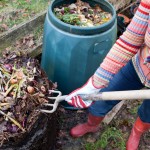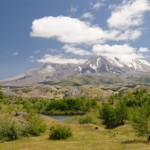I recently read an article in The New York Times with the interesting title, "Recycling the Leftovers." It was written by Stephanis Strom, one of their regular correspondents, and covered a variety of programs in America for recycling food scraps. Lynnette and I have been separating our own waste streams that for at least ten years and have a garbage bin, a trash sack, a recycle sack and a composting pail in our kitchen and laundry room. Our waste-collecting company keeps adding new items that can be recycled, but at present we only put out two containers for them: trash goes to the curb to be picked up weekly and recyclables go out every other week.
Now the city of Austin, Texas has plans to markedly extend its food waste pilot project; Strom's article says 14,000 Austin residences currently have a third garbage bin, one for food scraps, collected weekly Twenty-five years ago the city started with a "Dillo Dirt" program; the city made over a quarter million dollars last year selling the end product, compost made from yard clippings and treated sewage sludge. The newer approach, adding organic waste, currently has enrolled less than 10% of the city's ~185,000 households; the plan is for all of them to be offered the service. I'm unaware of a city-wide program here in Fort Collins for food scrap recycling; ours end up in a vermiculture bin that's outdoors, but in a fenced-in corner. The worms doing most of the work in turning food waste into compost thus far have survived our winters.
The concept is being highlighted nationally by the U.S. Food Waste Challenge (FWC), a joint project of the U.S. Department of Agriculture (USDA) and the Environmental Protection Agency (EPA). The goal of the FWC is to bring about a "fundamental shift" in the way we manage and even think about food and food waste. The USDA/EPA wants to have 400 organizations enrolled this years and 1,000 by 2020 and they are well on their way already with an impressive list of governmental and private partners including companies, colleges and universities, K-12 schools and at least one major hospital having joined.
We as individuals can't join the FWC, but there is a webpage of suggestions for consumers. Basically it says shop thoughtfully, cook with care, serve portions that you'll eat then and there, save whatever can be kept (while eating what would otherwise spoil) and, if possible, grow part of your meal. It also mentions we should shop our own refrigerators first; plan meals before we go grocery shopping so as to buy only those items we actually need; freeze, preserve or can seasonal produce; ask restaurants to bag up leftovers and be realistic at all-you-can eat buffets.
I was at a writers' meeting recently and drove to the event with my long-time writing mentor. She said her family almost always eats everything she buys, but even with a husband and three teenagers on board I knew she was being modest. She obviously shops carefully and plans ahead.
Our lunch yesterday featured a Quiche my wife (professionally a Jung) made that was "Jung Fun." It wasn't your typical recipe, but used up everything in the vegetable drawer that was needing to be eaten ASAP. We still occasionally have spoiled vegetables and fruits, especially when our CSA gives us more than its usual abundance, but those go into the compost bin.
We did go to the CSA a few days ago to purchase four beefsteak tomato plants. We've got a special above-ground gadget for planting tomatoes and have consistently done well with those we bought at a nursery, but, having grown up eating beefsteak tomatoes, I'm really looking forward to have an abundance of them. Our local grocery store generally has good produce, much of it grown locally or regionally, yet it's been my experience that homegrown tomatoes are several orders of magnitude better than anything I can buy at a store.
The EPA's Food Recovery Challenge webpage has a horrifying set of statistics from 2011 (they're still collecting/collating the 2013 stats apparently, but what happened to 2012?). Almost all (96%) of the 36 million tons of food waste generated in 2011 ended up in landfills or incinerators. The food sent to landfills breaks down and releases methane, a nasty greenhouse gas, twenty times as effective in increasing global temperature than CO2 is. More than a third of all methane released into the atmosphere comes from landfills (domesticated livestock accounts for 20% and natural gas and oil systems another 20%) .
While all that food is being wasted and much of it is contributing to global climate changes, 14.9% of U.S. households were food insecure in 2011, not knowing where they'd get their next meal. Fortunately we have a strong local Food Bank serving Larimer County and their "Plant It Forward" campaign's 2014 goal is to obtain 15,000 pounds of produce donated by local gardeners.
So where are you in the nationwide quest to cut food waste?





